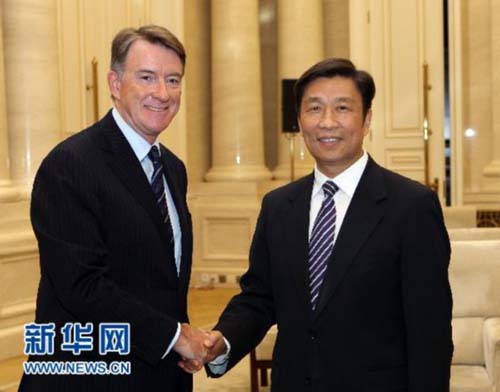CPC reaches out to political parties in the developed world
- By Kong Genhong
 0 Comment(s)
0 Comment(s) Print
Print E-mail China.org.cn, August 28, 2012
E-mail China.org.cn, August 28, 2012
Today the Communist Part of China (CPC) is in contact with over 600 political parties and organizations in more than 160 countries and regions, including many from the developed world. This has become a crucial part of the CPC's international relations.
Much of the party's contact with the western world's political forces was initiated in the early 1980s, when the CPC began to develop relationships with socialist parties in Europe in an attempted to transcend political differences and achieve understanding. These relationships were built on the principles of independence, equality, mutual respect and non-interference in other countries' internal affairs. In the mid-'80s, the CPC extended its relations to Western Europe's right wing parties.
This century, along with its recent adoption of a scientific approach to development and the goal of creating a "harmonious society", the CPC has continued to strengthen its relations with international and regional parties. The global financial crisis, in particular, has helped improve its working relations and mechanisms with Western political parties and push forward its friendly ties with major party groups in the European Parliament and other European parties. The party diplomacy has played an important role in guiding and shaping state relations.
Since 2010, Chinese delegations representing different levels of the party have paid visits to European and American countries to further links face to face, and dozens of party leaders and delegations from the developed countries have made the journey to China at the invitation of the CPC. Among them were Tony Abbott, leader of the Liberal Party of Australia, Michael Ignatieff, leader of the Liberal Party of Canada, and Phil Goff, then leader of the New Zealand Labour Party. Other guests included a raft of delegations from such parties as the Christian Democracy Party of Italy, Germany's Green Party, and the Communist Party of Spain, just to cite a few.
The three following regular high-profile exchanges between the CPC and the parties of the UK, the EU, and the U.S. are examples of how interparty relations' are contributing to international understanding and cooperation.
China-UK Leadership of the Future Forum
Every year since 2007, the leaders of the CPC and Britain's Conservative Party, Labour Party and Liberal Democrat Party have come together to participate in the China-UK Leadership of the Future Forum. During these five years, this meeting has evolved into a key instrument of bilateral exchange.
The first forum, held in Oxfordshire, addressed the strategic relationship between China and the West, climate change, environmental protection, energy security and sustainable development. The next year the Forum came to Beijing, and this time the two sides compared for their own references how the two countries approached the issue of development in theories and practices and discussed the relationships between China and Britain and Europe.
The third forum in 2009 returned to Oxfordshire and concentrated on the China-UK partnership amidst the financial crisis. The delegates discussed countermeasures and impacts of the crisis and exchanged ideas on the relationship between the media and politics. The two sides reached general consensus on many issues and enhanced mutual understanding and political trust.
The fourth forum was held in Beijing in September 2010. Participants conducted frank and in-depth exchanges and discussions centering on the theme of "China-UK Partnership in the Post Crisis World" and reached general consensus on key issues. The two sides shared the view that due to their economic complementarities and ever increasing inter-dependence, the two countries should enhance reciprocal cooperation in areas such as green energy, sustainable development and two-way investment; they should jointly stand opposed to trade protectionism, involve each other in candid dialogues on the basis of equality and mutual respect, and properly settle differences and sensitive issues in order to promote the constant development of the comprehensive strategic partnership between the two countries.
Oxfordshire played host to the most recent forum in September 2011, and the two sides eyed on how to develop a partnership that would facilitate their common economic growth. Over 30 young politicians held in-depth discussions on opportunities and challenges that confronted the economic and trade cooperation, common growth, social reform and party development of the two countries. Delegates exchanged opinions on UK's Plan for Growth and China's 12th Five-year Plan, as well as their development strategies for the next five years. They all agreed that it was their shared mission to boost economic growth, guarantee and improve livelihood, and realize sustainable development. The two sides also shared their experiences in achieving conceptural and policy innovations of their respective parties, and had candid exchanges on how to maintain the ruling party position.
Over the years the Forum has developed into a key tool that promotes understanding and friendship between the CPC and Britsh political parties and their young politicians and pushes forward healthy and stable development of the China-UK bilateral ties.






